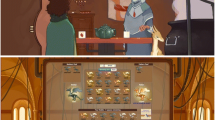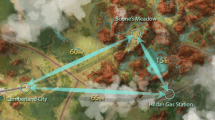Abstract
Rigorous studies of the impact of digital games on student learning remain relatively rare, as do studies of games as supports for learning difficult, core curricular concepts in the context of normal classroom practices. This study uses a blocked, cluster randomized controlled trial design to test the impact of a digital game, played as homework prior to instruction, and associated supplemental instructional activities, on middle grade students’ understanding of the process of photosynthesis. The role of the teacher as a potential moderator of the game’s impact on student outcomes was also investigated, using Classroom Assessment Scoring System-Secondary Edition (CLASS-S) observations as a measure of instructional quality. Study findings demonstrate that the intervention did not have a significant impact on student understanding of photosynthesis. The interaction of treatment teachers’ CLASS-S scores and students’ average photosynthesis assessment scores approached significance. This study suggests that when digital games are used as a step in the process of learning difficult conceptual material, teachers may need support and guidance to make productive connections between in-game experiences and the target concepts.

Similar content being viewed by others
References
Alderman, M. K. (2013). Motivation for achievement: Possibilities for teaching and learning. New York, NY: Routledge.
Bloom, H. S., Richburg-Hayes, L., & Black, A. R. (2007). Using covariates to improve precision for studies that randomize schools to evaluate educational interventions. Educational Evaluation and Policy Analysis, 29(1), 30–59.
Bloom, H., Zhu, P., Jacob, R., Raudenbush, S., Martinez, A., & Lin, F. (2008). Empirical issues in the design of group-randomized studies to measure the effects of interventions for children. MDRC working papers on research methodology. New York, NY: MDRC.
Bransford, J. D., & Schwartz, D. L. (1999). Rethinking transfer: A simple proposal with multiple implications. In A. Iran-Nejad & P. D. Pearson (Eds.), Review of research in education: 24 (pp. 61–100). Washington, DC: American Educational Research Association.
Brophy, J. E. (2010). Motivating students to learn. New York, NY: Routledge.
Buckingham, D. (2009). Beyond technology: Rethinking learning in the age of digital culture. In J. Pettersen (Ed.), Youth media democracy: Perceptions of new literacies. Proceedings of the youth media democracy conference (pp. 37–43). Dublin, Ireland: Center for Social and Educational Research.
Cameron, L. (2002). Metaphors in the learning of science: A discourse focus. British Educational Research Journal, 28(5), 673–688.
Chi, M. T. H. (2008). Three types of conceptual change: Belief revision, mental model transformation, and categorical shift. In S. Vosniadou (Ed.), Handbook of research on conceptual change (pp. 61–82). Mahwah, NJ: Lawrence Erlbaum Associates.
Chi, M. T. H., Roscoe, R. D., Slotta, J. D., Roy, M., & Chase, C. C. (2011). Misconceived causal explanations for emergent processes. Cognitive Science, 36(1), 1–61.
Clark, D. B., Tanner-Smith, E., & Killingsworth, S. (2013). Digital games for learning: A systematic review and meta-analysis, Preliminary executive summary and brief. http://www.sri.com/work/projects/glasslab-research.
Connolly, T. M., Boyle, E. A., MacArthur, E., Hainey, T., & Boyle, J. M. (2012). A systematic literature review of empirical evidence on computer games and serious games. Computers & Education, 59(2), 661–686.
Connolly, T. M., Stansfield, M., & Hainey, T. (2009). Towards the development of a games-based learning evaluation framework. In T. Connolly, M. Stansfield, & L. Boyle (Eds.), Games-based learning advancements for multisensory human computer interfaces: Techniques and effective practices (pp. 251–273). Hershey, PA: IGI Global.
de Freitas, S., & Oliver, M. (2006). How can exploratory learning with games and simulations within the curriculum be most effectively evaluated? Computers & Education, 46(3), 249–264.
Dede, C. (2009). Immersive interfaces for engagement and learning. Science, 323(5910), 66–69.
Deke, J., Dragoset, L., & Moore, R. (2010). Precision gains from publically available school proficiency measures compared to study-collected test scores in education cluster-randomized trials (NCEE 2010-4003). Washington, DC: National Center for Education Evaluation and Regional Assistance, Institute of Education Sciences, U.S. Department of Education.
Driver, R., Squires, A., Rushworth, P., & Wood-Robinson, V. (1993). Making sense of secondary science. London: Routledge.
Duit, R. (2009). Bibliography—STCSE: Students’ and teachers’ conceptions and science education. http://www.ipn.uni-kiel.de/aktuell/stcse/stcse.html.
Enders, C. K. (2010). Applied missing data analysis. New York, NY: Guilford Press.
Fraser, B. J. (1981). TOSRA test of science-related attitudes handbook. Hawthorn, VIC: Australian Council for Educational Research.
Gee, J. P. (2003). What video games have to teach us about learning and literacy. New York, NY: Palgrave Macmillan.
Gupta, A., Hammer, D., & Redish, E. F. (2011). The case for dynamic models of learners’ ontologies in physics. Journal of the Learning Sciences, 19(3), 285–321.
Hammer, D., Gupta, A., & Redish, E. F. (2011). On static and dynamic intuitive ontologies. Journal of the Learning Sciences, 20(1), 163–168.
Helsper, E., & Eynon, R. (2009). Digital natives: Where is the evidence? British Educational Research Journal, 36(3), 503–520.
International Telecommunications Union. (2013). Measuring the information society. ITU Publication No. 254. http://www.itu.int/en/ITU-D/Statistics/Documents/publications/mis2013/MIS2013_without_Annex_4.pdf.
Juul, J. (2003). The game, the player, the world: Looking for a heart of gameness. In M. Copier & J. Raessens (Eds.), Level up: Digital games research conference proceedings (pp. 30–45). Utrecht: Utrecht University.
Ke, F. (2009). A qualitative meta-analysis of computer games as learning tools. In R. Ferdig (Ed.), Handbook of research on effective electronic gaming in education (Vol. 1, pp. 1–32). Hershey, PA: Information Science Reference.
Ketelhut, D. J., & Schifter, C. C. (2011). Teachers and game-based learning: Improving understanding of how to increase efficacy of adoption. Computers & Education, 56(2), 539–546.
Koschmann, T., Hall, R. P., & Miyake, N. (Eds.). (2013). CSCL 2. New York, NY: Routledge.
Lenhart, A., Kahne, J., Middaugh, E., Macgill, A. R., Evans, C., & Vitak, J. (2008). Teens, video games, and civics. http://www.pewinternet.org/Reports/2008/Teens-Video-Games-and-Civics.aspx.
Linn, M. C., Davis, E. A., & Bell, P. (Eds.). (2004). Internet environments for science education. London: Routledge.
Malmberg, L. E., & Hagger, H. (2009). Changes in student teachers’ agency beliefs during a teacher education year, and relationships with observed classroom quality, and day-to-day experiences. British Journal of Educational Psychology, 79(4), 677–694.
Mayer, D. P. (1999). Measuring instructional practice: Can policymakers trust survey data? Educational Evaluation and Policy Analysis, 21(1), 29–45.
Millstone, J. (2012). Teacher attitudes about digital games in the classroom. New York: The Joan Ganz Cooney Center at Sesame Workshop in collaboration with BrainPOP.
Mullens, J. E., & Gayler, K. (1999). Measuring classroom instructional processes: Using survey and case study field test results to improve item construction. NCES 1999-08. Washington, DC: National Center for Education Evaluation and Regional Assistance, Institute of Education Sciences, U.S. Department of Education.
Palincsar, A. S. (1998). Social constructivist perspectives on teaching and learning. Annual Review of Psychology, 49, 345–375.
Papastergiou, M. (2009). Digital game-based learning in high school computer science education: Impact on educational effectiveness and student motivation. Computers & Education, 52(1), 1–12.
PBS & Grunwald Associates, LLC. (2011). Deepening connections: Teachers increasingly rely on media and technology. http://www.pbs.org/teachers/research.
Peugh, J. L., & Enders, C. K. (2004). Missing data in educational research: A review of reporting practices and suggestions for improvement. Review of Educational Research, 74(4), 525–556.
Pianta, R. C., & Hamre, B. K. (2009). Conceptualization, measurement, and improvement of classroom processes: Standardized observation can leverage capacity. Educational Researcher, 38(2), 109–119.
Pianta, R. C., Hamre, B. K., Hayes, N., & Mintz, S. (2011). Classroom assessment scoring system-secondary (CLASS-S). Charlottesville, VA: University of Virginia.
Pintrich, P. R. (1999). The role of motivation in promoting and sustaining self-regulated learning. International Journal of Educational Research, 31(6), 459–470.
Prensky, M. (2003). Digital game-based learning. ACM Computers in Entertainment, 1(1), 1–4.
Raudenbush, S. W., Bryk, A. S, & Congdon, R. (2004). HLM 6 for Windows. Computer software. Skokie, IL: Scientific Software International, Inc.
Richland, L. E., Zur, O., & Holyoak, K. J. (2007). Cognitive supports for analogies in the mathematics classroom. Science, 316(5828), 1128.
Rideout, V.J., Foehr, U.G., & Roberts, D.F. (2010). Generation M2: Media in the lives of 8- to 18-year-olds. http://kff.org/other/report/generation-m2-media-in-the-lives-of-8-to-18-year-olds/.
Roschelle, J., Knudsen, J., & Hegedus, S. (2010). From new technological infrastructures to curricular activity systems: Advanced designs for teaching and learning. In M. Jacobson & P. Reimann (Eds.), Designs for learning environments of the future (pp. 233–262). New York, NY: Springer.
Roth, W. M. (2013). On meaning and mental representation: A pragmatic approach. Rotterdam: Sense Publishers.
Salen, K., & Zimmerman, E. (2003). Rules of play: Game design fundamentals. Cambridge, MA: MIT Press.
Schneps, M. H., Sadler, P. M., Woll, S., & Crouse, L. (1989). A private universe. Motion picture. Annenberg Foundation/Corporation for Public Broadcasting Math and Science Project. Cambridge, MA: Harvard Smithsonian Center for Astrophysics.
Schwartz, D. L., & Martin, T. (2004). Inventing to prepare for learning: The hidden efficiency of original student production in statistics instruction. Cognition and Instruction, 22(2), 129–184.
Sheingold, K., Hawkins, J., & Char, C. (1984). “I’m the thinkist, you’re the typist”: The interaction of technology and the social life of classrooms. Journal of Social Issues, 40(3), 49–61.
Slotta, J. D., & Chi, M. T. H. (2006). Helping students understand challenging topics in science through ontology training. Cognition and Instruction, 24(2), 261–289.
Slotta, J. D., Chi, M. T. H., & Joram, E. (1995). Assessing students’ misclassification of physics concepts: An ontological basis for conceptual change. Cognition and Instruction, 13(3), 373–400.
Smith, J. P., diSessa, A. A., & Roschelle, J. (1994). Misconceptions reconceived: A constructivist analysis of knowledge in transition. Journal of the Learning Sciences, 3(2), 115–163.
Song, M., & Herman, R. (2010). Critical issues and common pitfalls in designing and conducting impact studies in education: Lessons learned from the what works clearinghouse (phase I). Educational Evaluation and Policy Analysis, 32(3), 351–371.
Squire, K., Barnett, M., Grant, J. M., & Higginbotham, T. (2004). Electromagnetism Supercharged!: Learning physics with digital simulation games. In Proceedings of the 6th international conference on learning sciences (Vol. 6, pp. 513–520).
Thomas, M. K., Barab, S. A., & Tuzun, H. (2009). Developing critical implementations of technology-rich innovations: A cross-case study of the implementation of Quest Atlantis. Journal of Educational Computing Research, 41(2), 125–153.
Venville, G. (2008). Knowledge acquisition as conceptual change: The case of a theory of biology. In O. N. Saracho & B. Spodek (Eds.), Contemporary perspectives on science and technology in early childhood education (pp. 41–63). Greenwich, CT: Information Age Publishing.
Vosniadou, S. (2008). International handbook of research on conceptual change. New York, NY: Taylor & Francis.
Vosniadou, S. (2012). Reframing the classical approach to conceptual change: Preconceptions, misconceptions and synthetic models. In B. J. Fraser, K. Tobin, & C. J. McRobbie (Eds.), Second international handbook of science education (Vol. 1, pp. 119–130). New York, NY: Springer.
Wayne, A. J., Yoon, K. S., Zhu, P., Cronen, S., & Garet, M. S. (2008). Experimenting with teacher professional development: Motives and methods. Educational Researcher, 37(8), 469–479.
Young, M. F., Slota, S., Cutter, A. B., Jalette, G., Mullin, G., Lai, B., et al. (2012). Our princess is in another castle: A review of trends in serious gaming for education. Review of Educational Research, 82(1), 61–89.
Acknowledgments
We gratefully acknowledge support for this work from the Institute of Education Sciences, U.S. Department of Education, Grant No. R305C080022. The research team would like to thank all of the teachers and students who participated in this study, as well as our advisory board members for their ongoing guidance and insight.
Author information
Authors and Affiliations
Corresponding author
Rights and permissions
About this article
Cite this article
Culp, K.M., Martin, W., Clements, M. et al. Testing the Impact of a Pre-instructional Digital Game on Middle-Grade Students’ Understanding of Photosynthesis. Tech Know Learn 20, 5–26 (2015). https://doi.org/10.1007/s10758-014-9233-5
Published:
Issue Date:
DOI: https://doi.org/10.1007/s10758-014-9233-5




